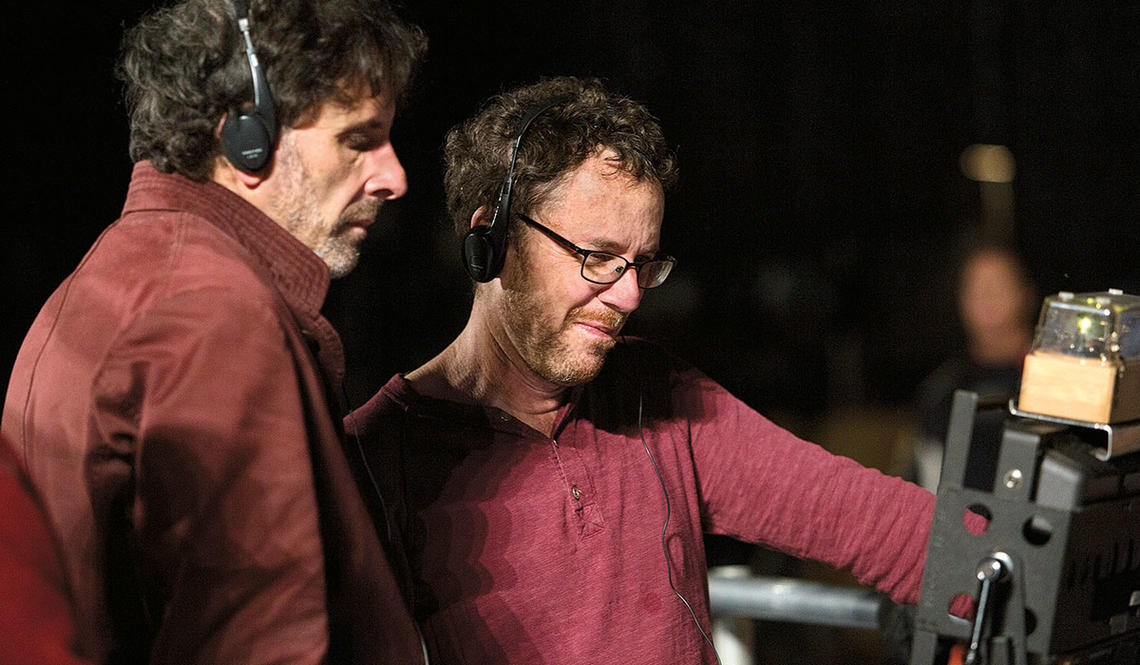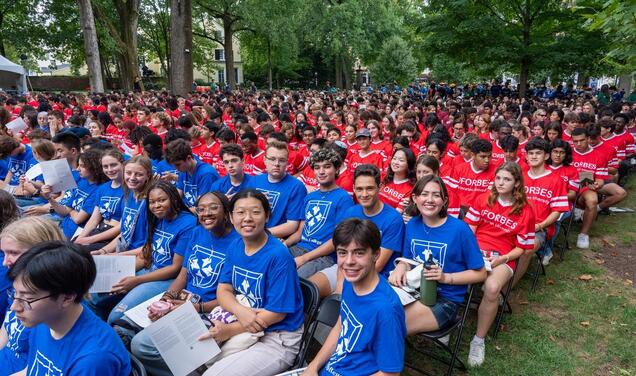
Filmmaker Ethan Coen ’79 never dons tiger stripes. There are no gaudy orange-and-black jackets or old Reunions costumes hanging in his closet. You’ll never find him leading a locomotive cheer at Princeton Stadium or Jadwin Gym.
Yes, there are many alumni who believe that life would not be complete without regular appearances in the P-rade. This is not one of those stories. In fact, to steal a line from Coen’s latest movie, Hail, Caesar!: Would that it were so simple.
During a January press junket for Hail, Caesar! at the Four Seasons Hotel in Beverly Hills, Coen takes a break from discussing his new film to talk about his old dorm room, to the extent that he can remember it. (“Do you remember all the dorms you lived in?” he asks incredulously.) Dressed in a brown work shirt and black pants, he sinks into a deep couch, removes his glasses, rubs his eyes, and tries to conjure memories from the dead past.
He has never been a joiner, Coen says. He made no lasting friendships during his three years at Princeton and left few footprints. Asked what extracurriculars occupied him back then, he answers: “Basically nothing — no theatrics, no arch sings.”
Where then, to find some traces of the institution on the man — or the man on the institution? O Ethan, where art thou?
Coen was raised in the Minneapolis suburb of St. Louis Park, the youngest child of college professors. (He and his partner/brother, Joel, have an older sister, as well.) Precocious and restless, he left high school after his sophomore year to attend Simon’s Rock, a four-year experimental college in Great Barrington, Mass., that is now affiliated with Bard College. The school was designed for students as young as 16 who, as its brochure says, “don’t want more of the same.” After a year, however, Coen grew bored at the tiny liberal-arts school and transferred to Princeton, attracted by its strong philosophy department.
“I definitely got a good education. How it prepared me for what I’m doing, I have no idea. But that’s the liberal-arts thing!”
Ethan Coen ’79
Already young for his class, Coen did not find Princeton congenial, at least socially. The eating clubs, he says, “struck me as kind of odd — fraternities by another name.” On many weekends, he visited Joel, who also had attended Simon’s Rock before transferring to New York University.
Although Coen did not study film as an undergraduate, Allan Nairn ’79, his sophomore-year roommate, says he still can picture Coen (“very smart, very funny”) sitting for hours at a time in their dorm window, chain-smoking and talking on the phone with Joel or a high school friend back in Minnesota, casting movies they were imagining in their heads. Several years later, when Nairn read that the Coen brothers’ first movie, Blood Simple, had been released, he thought, “Wow, he made it real!”
After two years at Princeton, Coen took a year off and returned to western Massachusetts to work. “I had had enough of school for a while,” he explains. “It’s weird. I had been in school, obviously, for as long as I could remember, which doesn’t trouble most people before they graduate college, but I just thought, man, I’ve gotta take a year off.”
Getting back in to Princeton, however, proved more complicated than he had anticipated. According to Josh Levine’s book The Coen Brothers: The Story of Two American Filmmakers, Coen neglected to inform the registrar that he intended to return to finish his degree. He cooked up an excuse, claiming that he had missed the registration deadline because he had lost an arm in a hunting accident at his brother-in-law’s apartment, and even forged a doctor’s note to “prove” it. The University readmitted him, but suggested that he see a psychiatrist. (Coen did not respond to a question about this story.)
Back in the classroom, things finally seemed to click. Coen embraced the philosophy department and still praises its faculty members for their dedication to undergraduates, particularly professor emeritus Paul Benacerraf and the late Walter Kaufmann. His thesis adviser, Raymond Geuss, recently retired from Cambridge University, remembers Coen as a driven student and a bit of a social “misfit.” “He seemed to be much more like a Continental student than most of the Americans,” Geuss recalls. “He had wider cultural references than most of his peers. He was not aloof, but self-sufficient and not completely at his ease.”
Coen wrote his thesis on philosopher Ludwig Wittgenstein, who appealed to him, he explains, “because he didn’t seem full of [expletive]. He seemed ‘right,’ which is a virtue in a philosopher.” Geuss hears the story and chuckles. “Yes, I can hear him saying something like that.”
“I definitely got a good education,” Coen says with enthusiasm. “How it prepared me for what I’m doing, I have no idea. But that’s the liberal-arts thing! I felt well served by the institution. It prepared me for ... something.”
What that “something” was, even Coen did not know at the time. After submitting his thesis, he left Princeton without bothering to attend Commencement. While many of his classmates were going off to graduate school or business, Coen worked temp jobs in New York. Joel, who had gone briefly to graduate school in Texas, soon joined him and they began writing scripts in their free time. Blood Simple, released in 1984, was a critical success, and the brothers have been at it ever since. Over the last three decades, they have written, produced, or directed nearly two dozen films and been nominated for 13 Academy Awards, winning four.
Though he has returned to campus a few times to look around, Coen volunteers that he has never marched in the P-rade. “I just can’t — the reunion thing,” he says with a nervous laugh. “Some people can do it. It’s just not one of my gifts.” Two years ago, he appeared at the University’s James M. Stewart ’32 Theater to discuss his film Inside Llewyn Davis with poet and professor Paul Muldoon, a longtime friend. “I was struck by how very connected [Coen] was with our students, who crowded around him as if he were a pop star or a prophet,” Muldoon writes in an email. “He’s a bit of both, of course.”
Pore through the Coen brothers’ lengthy body of work, and Princeton appears only once. In their 2008 comedic thriller, Burn After Reading, John Malkovich’s character, Osborne Cox ’73, a has-been CIA agent, attends a class dinner where he and a bunch of tuxedo-clad Princetonians sing a rousing rendition of “Old Nassau.” Watch closely, though, and you will see that the details are not quite right: The phrasing of the chorus is off, and no one does the arm-waving gesture, either. Coen hasn’t sung the song very often, but he gave a nod to tradition nonetheless:
“There was just something that tickled me about that.”










No responses yet